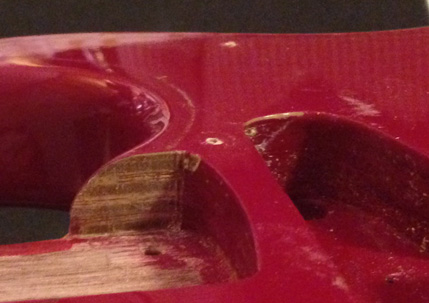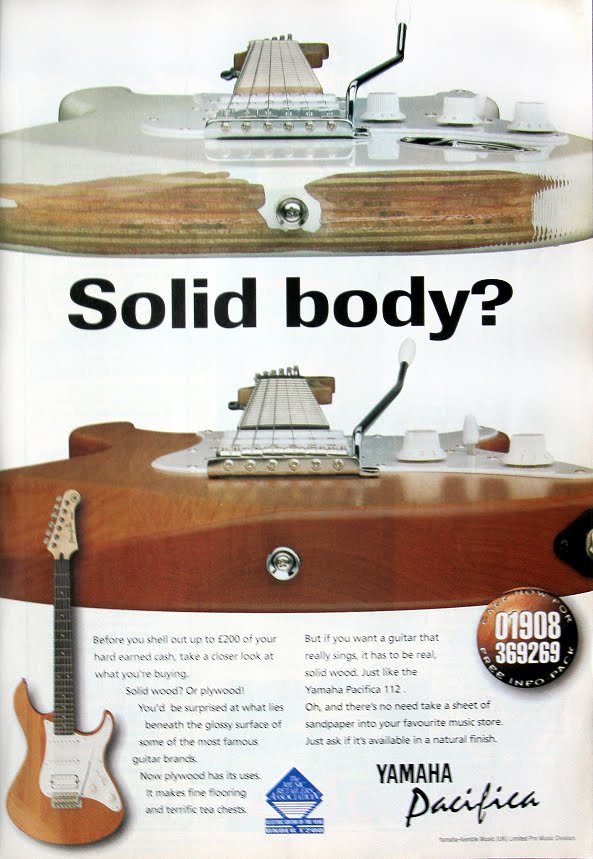Curious about plywood guitars? Wondering if they’re any good? Well, let’s dive right in and explore the question, “Are plywood guitars bad?” Don’t worry, I’ve got all the answers for you, so let’s break it down!
Now, you might be thinking, “Wait, why are we even talking about plywood guitars?” Good question! Plywood guitars often get a bad rap, but is it really justified? Let’s find out if there’s more to these guitars than meets the eye.
So, whether you’re a budding musician or just genuinely interested in the world of guitars, stick around as we uncover the truth about plywood guitars. Are they truly as bad as people say? Let’s buckle up and embark on this musical journey together!

Are Plywood Guitars Bad? Debunking the Myths and Understanding the Reality
Plywood guitars have long been subject to debates, with some musicians claiming they are inferior and unworthy of consideration. However, the truth is far more nuanced. In this article, we will delve into the world of plywood guitars, exploring their construction, sound quality, durability, and value for money. By the end, you’ll have a clearer understanding of whether plywood guitars are indeed “bad” or if they simply suffer from a misconceived reputation.
1. The Construction of Plywood Guitars
Plywood guitars are made by layering thin sheets of wood, called veneers, and bonding them together with adhesive. The outer layers are typically aesthetic veneers while the inner layers, usually made of lower-grade wood, provide stability and strength. Contrary to popular belief, plywood construction is not inherently flawed. In fact, many high-quality instruments, including some renowned acoustic guitars, utilize plywood for their construction.
One advantage of plywood is its stability. Unlike solid wood, which can expand and contract with changes in temperature and humidity, plywood is less susceptible to these variations. This stability ensures that plywood guitars are less prone to warping or cracking, making them a reliable choice for musicians who travel frequently or play in diverse environments.
The Benefits of Plywood Construction
1. Enhanced durability: Plywood is less likely to suffer from cracks or warps, ensuring that your instrument withstands the test of time.
2. Greater affordability: Plywood is generally more cost-effective than solid wood, allowing aspiring musicians to own a quality instrument without breaking the bank.
3. Consistent sound: The uniformity of plywood contributes to a consistent sound across the entire instrument, eliminating variations that can arise from using different sections of solid wood.
2. Sound Quality of Plywood Guitars
One of the criticisms often leveled against plywood guitars is their perceived inferior sound quality compared to their solid wood counterparts. While it is true that plywood guitars may lack some of the depth and resonance found in high-end solid wood instruments, this does not make them inherently “bad.” The sound produced by a guitar is influenced by various factors, including the type of wood, design, and construction techniques.
It’s essential to remember that sound is subjective. What one guitarist may consider “bad,” another might find perfectly suitable for their playing style and genre. Plywood guitars are known for their bright and clear tones, making them well-suited for genres such as folk, blues, or country. Their sound may lack some of the richness and complexity found in high-end solid wood guitars, but they can still produce enjoyable music.
Comparing Plywood and Solid Wood Sound
While solid wood guitars are often praised for their warm and resonant sound, plywood guitars have their unique qualities. Here are a few points of comparison:
1. Brightness: Plywood guitars tend to have a brighter sound, which can cut through in ensemble playing or when playing with a pick.
2. Sustain: Solid wood guitars generally have longer sustain, allowing notes to ring out. Plywood guitars may have slightly shorter sustain, but this can also enhance attack and articulation.
3. Cost-Effectiveness: Plywood guitars offer an affordable option for musicians who are on a budget, without compromising too much on tone.
3. Value for Money and Longevity
Plywood guitars provide excellent value for money, especially for beginners or those seeking a reliable instrument for regular gigging or traveling. The affordability of plywood construction means that you can own a decent-quality guitar without spending a fortune. Additionally, the stability of plywood makes it less likely to require costly repairs or maintenance due to warping or cracking.
It’s important to note that plywood guitars come in various qualities and price ranges. Higher-end plywood guitars can rival some mid-range solid wood instruments in terms of sound and craftsmanship. Therefore, it’s crucial to research and try different models within your budget to find the best option for your needs.
Factors Affecting Longevity
1. Care and maintenance: Proper care, including regular cleaning, restringing, and humidification, can significantly extend the life of any guitar, including plywood models.
2. Craftsmanship: Well-made plywood guitars with attention to detail in construction and finishing can last for many years and provide reliable performance.
3. Upgrades: In some cases, upgrading components such as the nut, saddle, or pickups can enhance the sound and playability of a plywood guitar, further extending its usability.
Additional Resources and Expert Opinions
1. Interviews with professional guitarists who have experience playing and recording with plywood guitars.
2. In-depth analysis of different plywood guitar models and their qualities.
3. Comparative studies between plywood and solid wood guitars in various musical settings.
4. Exploration of the history and evolution of plywood construction in guitar making.
Debunking the Myths and Embracing the Potential of Plywood Guitars
When it comes to assessing the quality of a guitar, it’s essential to consider various factors beyond the materials used. Plywood guitars can offer excellent value for money, durability, and reliable performance. While they may not match the tonal complexity of high-end solid wood instruments, they excel in their own right with their clarity and affordability. So, the next time you come across a plywood guitar, don’t dismiss it based on preconceived notions. Give it a chance, play it, and judge for yourself. You might be pleasantly surprised by the hidden gems waiting to be discovered in the world of plywood guitars.
Key Takeaways: Are Plywood Guitars Bad?
- Plywood guitars are not necessarily bad for beginners or casual players.
- They are more affordable compared to solid wood guitars.
- Plywood guitars can still produce decent sound and are durable.
- However, plywood guitars may lack the depth and resonance of solid wood guitars.
- If you are a professional or advanced player, solid wood guitars may be a better option for their superior sound quality.
Frequently Asked Questions
When it comes to choosing a guitar, many people wonder about the quality of plywood guitars. Here are some common questions and answers to help you make an informed decision.
1. Are plywood guitars bad for beginners?
Plywood guitars can be a great option for beginners. They are often more affordable than solid wood guitars and can still provide a decent sound. While solid wood guitars may have a richer tone, plywood guitars are durable and can withstand the wear and tear that beginners may put them through. It’s important to consider your budget, playing style, and preferences when choosing a guitar, but a plywood guitar can certainly be a good choice for beginners.
2. Do plywood guitars sound inferior to solid wood guitars?
While solid wood guitars may have a more resonant tone, plywood guitars can still produce a pleasant sound. The construction of a guitar, including the bracing and craftsmanship, also plays a significant role in the sound quality. Plywood guitars are often designed to be durable and affordable, so while they may not have the same warmth and depth as a solid wood guitar, they can still be suitable for different playing styles and genres.
3. Are plywood guitars less durable than solid wood guitars?
Plywood guitars can be quite durable. They are constructed by layering thin sheets of wood together, which can make them more resistant to humidity and temperature changes. However, they may not be as resistant to physical impact as solid wood guitars. That being said, proper care and handling can prolong the lifespan of a plywood guitar. Regular maintenance, including keeping it in a suitable case and avoiding extreme conditions, will help ensure its longevity.
4. Can plywood guitars be upgraded with better components?
Yes, plywood guitars can be upgraded with better components. The hardware, such as the tuners, bridge, and pickup, can be replaced to improve the guitar’s performance. Upgrading the strings and even installing a new nut or saddle can also make a significant difference in the playability and tone. However, it’s important to assess the overall quality of the guitar before investing in upgrades. Sometimes, it may be more cost-effective to save up for a better-quality instrument instead of extensively upgrading a plywood guitar.
5. Are plywood guitars suitable for professional musicians?
Plywood guitars may not be the first choice for professional musicians due to their tonal limitations. However, some professional guitarists have managed to produce incredible music on plywood guitars. The choice of instrument ultimately depends on personal preference, the specific sound desired, and the style of music being played. If a plywood guitar feels comfortable to play and delivers the desired sound, it can certainly be used by professional musicians. Many famous musicians have shown that it’s not always about the material, but the skill and creativity of the player.

What Is The Deal With Plywood Guitars?
Summary
So, are plywood guitars bad? Well, they’re not necessarily bad, but they do have some drawbacks. Plywood guitars may be more affordable and durable, but they tend to have a poorer sound quality compared to solid wood guitars. However, for beginners or casual players, plywood guitars can be a good option to start with.
Furthermore, plywood guitars are usually mass-produced, which means they may lack the individual craftsmanship and unique characteristics found in higher-end guitars. Additionally, because plywood is made up of layers of wood glued together, it can be prone to warping or splitting over time.
Ultimately, it comes down to your personal preference and budget. If you’re just starting out or on a tight budget, a plywood guitar can be a decent choice. However, if you’re looking for a higher quality, more refined instrument, it may be worth investing in a solid wood guitar. Remember, the most important thing is to enjoy making music, regardless of the material your guitar is made of.
